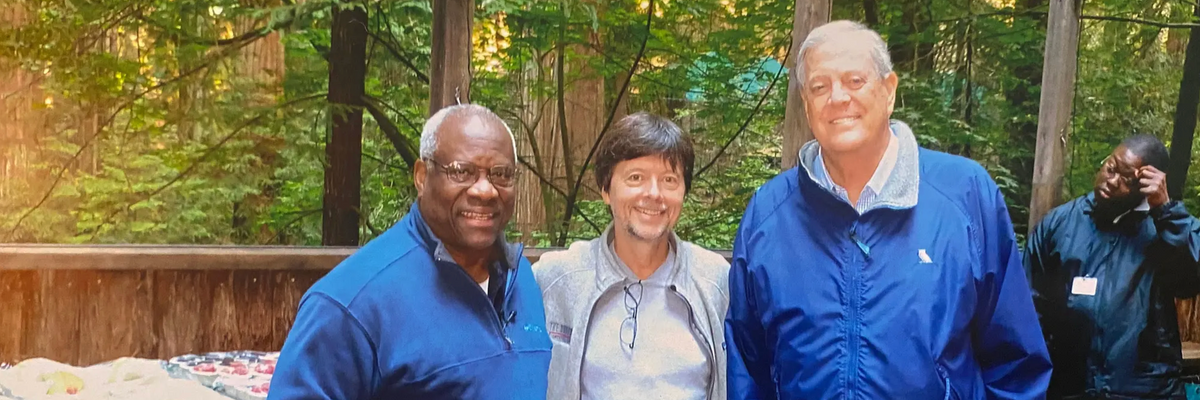Yesterday, the Supreme Court announced an ethics code for the justices. But the code is utterly empty. It has no enforcement mechanism and no mechanism for the public to lodge complaints of misconduct.
It’s public relations pablum.
The court effectively admitted this, saying that “the absence of a Code… has led in recent years to the misunderstanding that the justices of this court, unlike all other jurists in this country, regard themselves as unrestricted by any ethics rules.”
The new code has no system for the public to lodge complaints or for any outside review of alleged ethical violations.
Misunderstanding? I’m sorry, but the public understands quite well that the justices regard themselves as free to do whatever they wish, in terms of ethics.
In April, ProPublicadocumented years of undisclosed luxury travel enjoyed by Justice Clarence Thomas, including private jets and trips aboard a super-yacht courtesy of a Texas real estate magnate and conservative donor, Harlan Crow. Since then, other undisclosed gifts to Thomas have been revealed, all from powerful friends—including a motor coach, private school tuition for a grandnephew the justice was raising, and the justice’s mother’s home in an undisclosed real estate deal.
Thomas has also come under fire for failing to recuse himself from cases related to attacks on the 2020 election results—given that his wife, Virginia Thomas, worked to overturn the 2020 election results in the weeks leading up to the Capitol attack.
Other justices, including Samuel A. Alito Jr. and Neil M. Gorsuch, have also failed to disclose their connections to wealthy people with close ties to the court. Alito did not report a 2008 trip on the private jet of Paul Singer, a hedge fund billionaire who later had cases before the court.
Alito defended his conduct in an op-ed published by The Wall Street Journal, writing that he had “no obligation” to recuse himself from the cases involving Singer’s business, and did not have to report the travel and lodging because the jet constituted a “facility” exempt from reporting requirements. He claimed that the justices “commonly interpreted” hospitality to include accommodations and transportation for social events that did not have to be reported as gifts.
In addition to Thomas and Alito, Gorsuch did not disclose that the head of a major law firm had purchased a Colorado vacation property that he co-owned. Justice Sonia Sotomayor’s staff pushed public entities hosting her to purchase her books; she failed to recuse herself from cases involving her book publisher.
The new code would have had no effect on any of these instances and will have no effect on future ethical lapses.
The new rules don’t require any changes in how the justices conduct themselves.
The new code has no system for the public to lodge complaints or for any outside review of alleged ethical violations.
In the absence of any enforcement process, the document states that Chief Justice John Roberts has directed court staff to do a review of “best practices” based on systems already in place in the lower courts. It didn’t provide a timeline for that review or what action the court might take in response.
What prompted the court to put out this piece of PR pablum now?
Probably the fact that the Senate Judiciary Committee has scheduled a vote on Thursday for issuing subpoenas to Republican megadonor Harlan Crow and conservative legal activist Leonard Leo as part of its ongoing investigation into the Supreme Court.
As Senator Sheldon Whitehouse, chair of the Judiciary Committee subcommittee overseeing the federal courts, explained:
We need to develop information about how systemic this was. This isn’t just a random gift here and a random gift there. It’s always the same individuals, the same front groups. It’s—there’s a network effect here that we need to understand… What you have is billionaires with a demonstrated pattern of trying to influence the Supreme Court through a whole variety of groups by giving donations and participating, who are at the same time also giving enormous, massive, secret gifts to justices. Just on its face, that merits investigation. And if it happened in any other court in the United States, it would have been investigated. There would have been fact-finding, and there would have been a result and consequences. It’s only the Supreme Court that is living outside the bounds of the rules.
The Supreme Court’s new “Code of Ethics” changes nothing. The court is still living outside the bounds of rules.
Ultimately, I blame Chief Justice John Roberts. The court’s chief justice is supposed to maintain public trust and confidence in the court, but Roberts has done everything possible to avoid a Code of Ethics with teeth. This latest pathetic attempt at pacifying the public will do little to reverse the sharp decline in public confidence in the nation’s highest court.
At his nomination hearing in September 2005, I testified against Roberts becoming the next chief justice. I had no confidence in his ability or willingness to put the public interest above the interests of individual justices. Sad to say, I’ve been proven correct.
